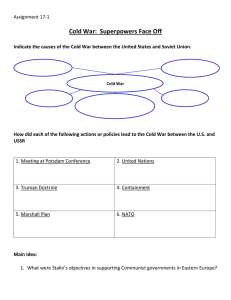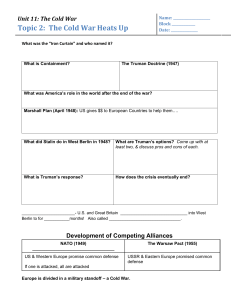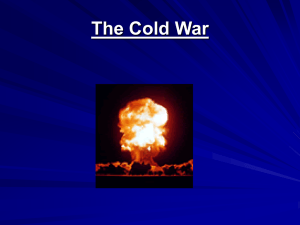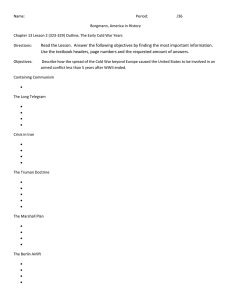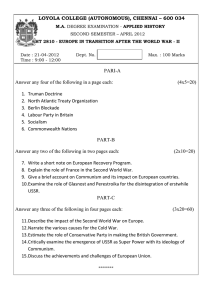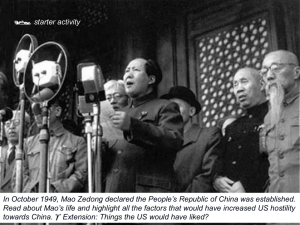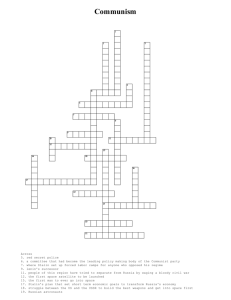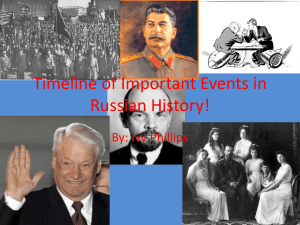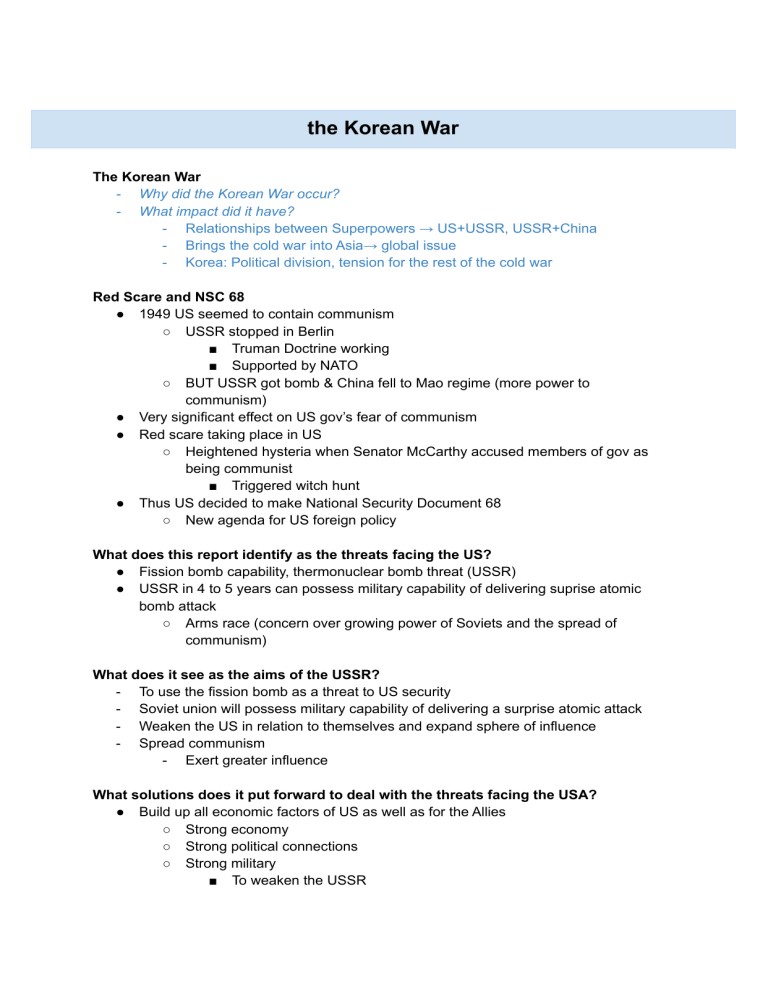
the Korean War The Korean War - Why did the Korean War occur? - What impact did it have? - Relationships between Superpowers → US+USSR, USSR+China - Brings the cold war into Asia→ global issue - Korea: Political division, tension for the rest of the cold war Red Scare and NSC 68 ● 1949 US seemed to contain communism ○ USSR stopped in Berlin ■ Truman Doctrine working ■ Supported by NATO ○ BUT USSR got bomb & China fell to Mao regime (more power to communism) ● Very significant effect on US gov’s fear of communism ● Red scare taking place in US ○ Heightened hysteria when Senator McCarthy accused members of gov as being communist ■ Triggered witch hunt ● Thus US decided to make National Security Document 68 ○ New agenda for US foreign policy What does this report identify as the threats facing the US? ● Fission bomb capability, thermonuclear bomb threat (USSR) ● USSR in 4 to 5 years can possess military capability of delivering suprise atomic bomb attack ○ Arms race (concern over growing power of Soviets and the spread of communism) What does it see as the aims of the USSR? - To use the fission bomb as a threat to US security - Soviet union will possess military capability of delivering a surprise atomic attack - Weaken the US in relation to themselves and expand sphere of influence - Spread communism - Exert greater influence What solutions does it put forward to deal with the threats facing the USA? ● Build up all economic factors of US as well as for the Allies ○ Strong economy ○ Strong political connections ○ Strong military ■ To weaken the USSR How is this document both similar and different to that of the Truman Doctrine? - Truman doctrine doesnt say to expand their military - Wants to have strong economies and democratic governments - Containing communism - Militaristic view was new, in this document - Aim was to withdraw from their sphere of influence, unlike the Truman doctrine NSC68 ● Not immediately implemented ● Pres. Truman’s democratic party faced congressional elections (Nov. 1950) ○ Didn’t want to recognize communist China ● 25 June 1950 NK attacked SK ○ Seen as example of Soviet expansionism ● USA: belief in monolithic Communist bloc ○ NK assumed to be following Stalin’s orders ● Fear that failure to take action → undermine credibility of USA (resisting Communism) ○ & Would encourage domino effect in neighbours ● Idea that communism would speak quickly across countries = domino effect ● US response in Korea dictated by same policy used in EU = containment Second cause: The situation of Korea after the Second World War - Japan officially annexed Korea in 1910 - Still in occupation after world war 2 ended - Korean nationalists were not allowed to decide the fate of Korea in 1945 - US and USSR would take joint responsibility for repatriating japanese forces there - 38th parallel line of latitude taken as the point of division - USSR occupying north - USA occupying south - Originally agreed to be temporary agreement - Council of Foreign Ministers Moscow conference in december 1945 - Agreed on creation of a provisional government - Short period of trusteeship/supervision - Leading to independence - Difficult to achieve - As cold war developed, US and USSR would be less willing to cooperate - Despite moscow agreement 1945 - Separate administrations developed on either side - South → Synghman Rhee, rebel who fought against japanese - - North → Kim il Sung, Russian trained Korean Communist who had been a guerilla fighter against japanese - Both were korean nationalists - Both wanted to end the separation of Korea - Both thought they were the new leader of new united south korea With increasing tensions - Division of Korea confirmed in 1947 - USA persuaded UN officials to oversee elections - Refused in the North, but was used in the South - Most Koreans opposed the partition - ROK was set up as an undemocratic government - Was strongly anti-communist - Recognized as legitimate by the UN general assembly - DPRK was founded in the north - Immediately recognized by communist bloc - USA supported ROK (Republic of Korea) with military and economic aid - Did not intend to station troops (left in mid 1949) - Soviet troops left north in 1948 - USA made clear that europe was the most important area in the cold war Maintained strong points offshore from Japan to Philippines, instead of involving themselves in expensive military commitments on the mainland - Made clear in Dean Achsons speech “perimeter” in january 1950 - South korea and Taiwan publicly excluded from the american defensive perimeter in the western pacific - Actions of Kim Il-Sung ● He and Synghman Rhee wanted to unify the country ● Neither side could unify the country on its own ○ Involvement of Soviets supporting Kim Il Sung or Americans supporting Synghman Rhee = essential ● Kim persuaded Stalin that he should support attack on south ○ He had no interest but eventually agreed ● Motivation for war came from Pyongyang ● Truman’s administration’s assumption June 1950 = war was Stalin’s initiative is false ○ His support for Kim was key in war starting 4. The role of Stalin and Mao - Stalin initially refused to help and only agreed after appeals from Kim il-sung - Historians not sure why he decided to change his mind - Perhaps he was feeling more confident because the chinese had become communists - Or worried about US determination to turn japan into strong anti-communist state - - - - Gaining influence over Korea would help secure soviet position in northeast asia Might have made assumptions that the US would not intervene due to “perimeter speech” Historian Gaddis sees this “opportunism” of Stalin as an important factor Historian John Lewis Gaddis: Stalin’s opportunism = factor – his tendency to advance in situations without provoking too strong a response - Acheson’s perimeter speech could have provided Stalin with a opportunity’ Mao supported the invasion as Kim, on a visit to Mao, gave the impression that Stalin was more enthusiastic than he was - Needed Stalin’s support for his plans to invade Taiwan → both Stalin and Mao misjudged the situation - → Historian Warren Cohen describes Stalin's actions in agreeing to support Kim as his “most disastrous Cold war gamble”. Truman's response to the invasion was swift and resulted in a large UN force being sent to Korea to push back the North Korean forces. What were the military developments in the Korean War? ● ● ● ● ● ● ● ● ● ● ● Initial push by NK led them into SK leaving 1 peninsula ○ SK and Americans pushed into there around Pusan General MacArthur led UN forces in the amphibious landing at Inchon to bypass K troops ○ Retook Seoul and drove NK back to the 38th parallel US redefined war aims ○ Just ‘containment’ → ‘containment and policy of rollback’ ○ = liberating NK from communist rule and reuniting Korea UN forces crossed 38th parallel into NK territory → captured Pyongyang in October March towards Yula river → concerned China ○ 27 Nov. 1950 200,000 chinese joined 150,000 NK ■ UN retreated ■ Pyongyang recaptured in December ■ NK & their allies retaken all land up to 38th parallel Stalemate around 38th parallel Truman = US needed to go back to original aim above 38th parallel McArthur disagreed ○ Was fired Peace talks 1951 = focus on repatriation of prisoners of war (POW) War continued for 2 years ○ Heavy casualties ○ US pressure on China via atom bomb threat Military armistice signed at Panmunjom July 1953 What was the impact of the Korean war on international relations? As a result of the war, the US took following actions - - - defence cuts in the conventional military forces were initiated by Eisenhower - On the advice that nuclear weapons were an effective deterrent - Led to the policy of brinkmanship West Germany was given membership of NATO in 1955 to strengthen its european alliance and in response to the soviet establishment of the warsaw pact alliance The recommendations of NSC 68 to triple the defence budget was now implemented The US established a new alliance bloc, SEATO (the Southeast Asia Treaty Organization) in 1954. ¨The US signed a treaty with Japan in 1952 which enabled to keep military bases in Japan USA now committed itself to defending Taiwan - Following the Korean war it sent Jiang Jieshi with military and economic aid and continued to recognise Taiwan as the only official chinese state until 1971 China now isolated by USA US became more committed to supporting other regimes in Asia that it believed were resisting communism - Lead to US involvement in philippines and Vietnam What did the Korean war and the subsequent actions of the USA mean for other countries? For korea: - the cost in human lives and property was vast - No hope of reunification - No longer a local issue - Coldware issue and the ceasefire line turned into heavily armed cold war frontier - North Korea under communist rule - South korea became capitalist success story with heavy American and Japanese investment For China: - Though isolated by the USA, China's reputation grew greatly - Became major power in the region - Preserved its own revolution - Took on the USA and successfully saved North Korea - Increased Mao Zedong's reputation at home and strengthened chinese revolution - Valuable resources at home were diverting from recovery to the war effort - China's aim of reuniting Taiwan was more difficult - Stalin's reluctance throughout the war to help Mao with any substantial military commitments - Mao less likely to rely on Soviet and would be less worried about following Moscow's lead For the USSR: - USSR kept out of direct conflict with USA - Results of the Korean war not good for USSR - US decision to triple its defence budget, rearm west, maintain troops in Europe and fight communism in Asia - Soviet embroiled in even more intense and broader cold war standoff than in 1950 For south east asia: - USA perception of all communist movements as being part of “Monolithic” movement and its commitment to intervene wherever it saw that there was a threat - South-east asia became involved in the cold war - Harder for nationalist movements in the region to triumph in the post-colonial era - Many groups forced into increasing dependency on the USSR or China - Only Vietnam in which USA, USSR and China became directly involved in the fighting What did the Korean War mean for the Cold War? ● Korean war → globalization of Cold war ● USA & USSR in conflicts in Asia and Eu ○ Would spread to other parts of developing world ● Led to militarization of CW ● goal : maintain increased military commitments ○ US defence spending increased (10% of GDP in 1950s) ● Eu: increased military spending → boosted econ prosperity in both regions ● USSR: Red army increased from 2.8mill 1950 to 5.8mill by 1955 ○ Stalin’s successors cut military spending after 1955 whilst continuing development of nuclear armaments ● The US established a new alliance bloc, SEATO (the Southeast Asia Treaty Organisation) in 1954.
